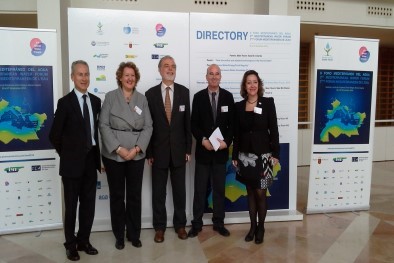A milestone of this Process, the 2nd Mediterranean Water Forum, took place in Murcia, Spain, on November 25-27, 2014. During the regional event and through an interplay of plenaries, debate panels, side events and working groups, around 300 stakeholders exchanged views on key water challenges and solutions, new innovative technologies, as well as ways to strengthen the water management knowledge base, and discussed current and upcoming issues, such as the water-food-energy security nexus.
The five thematic groups of the Mediterranean Process convened in parallel sessions in Murcia and concretised the Mediterranean contribution for Korea. Two of the themes, Effective Water Governance, as well as Education & Capacity Building, were led by GWP-Med and the Mediterranean Information Office for Environment, Culture and Sustainable Development (MIO-ECSDE) respectively. Through an inclusive and participatory approach involving representatives of national authorities, civil society, private sector, consultancies and regional organisations, the two groups reflected on draft concept notes prepared in advance of Murcia, agreed on their finalised version, as well as the provisional outline of the related sessions in Korea.
Nurturing a culture of dialogue, insisting on institutional and legislative reforms, ensuring participation including through decentralised models, using awareness raising to overcome mistrust and creating the enabling environment for sustainable financing, were among the key issues debated in the Governance Group. The impact of the post- Arab Spring regional reality on the water sector, the lingering socio-political turmoil and the need to better account for both current and upcoming challenges, were also highlighted. The Education & Capacity Building Group discussed, among other, the role of water in all education types and levels, as well as the need for multi/trans-disciplinary approaches in teaching Integrated Water Resources Management. The region’s pioneering contribution to the 7th WWF, with the Mediterranean Strategy to Education for Sustainable Development (MSESD) endorsed by the UfM’s 43 Ministers of Environment in May 2014, was emphasized.
The key recommendations and conclusions from the discussions in the two groups will be further enriched by relevant discussions bound to take place during the final Mediterranean regional workshop scheduled for mid-March 2015 in Athens, Greece, in the framework of the Mediterranean Process. They will ultimately feed discussions during the 7th World Water Forum and will form part of inter-regional sessions so as to enhance the knowledge and experience sharing across regions.
